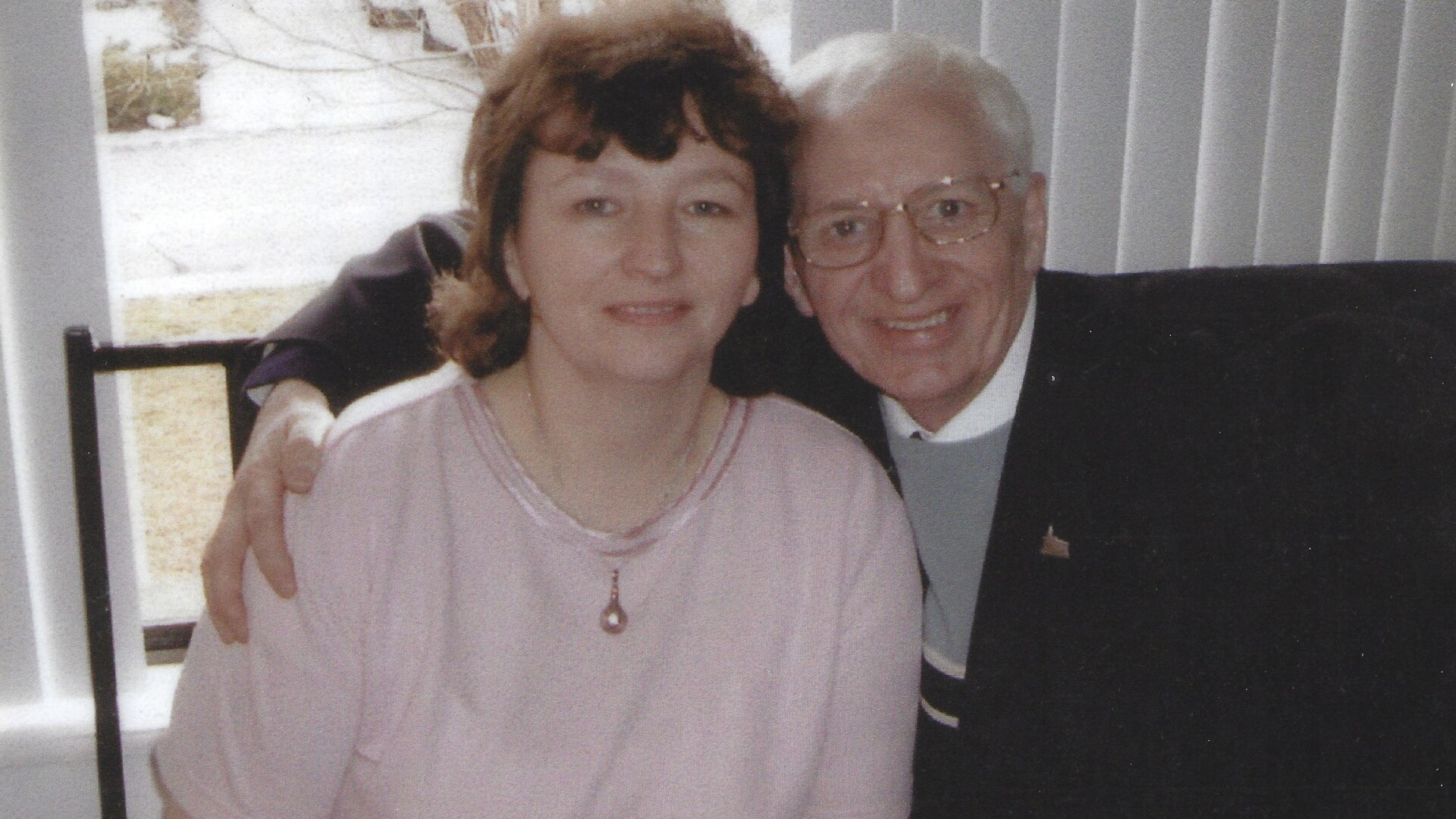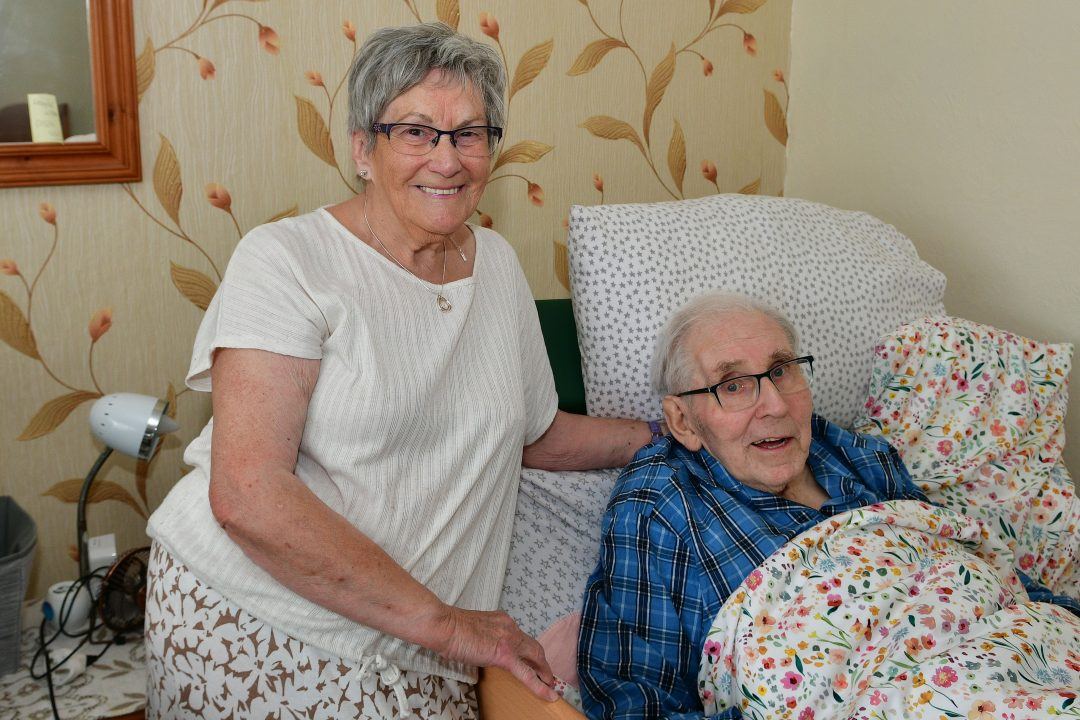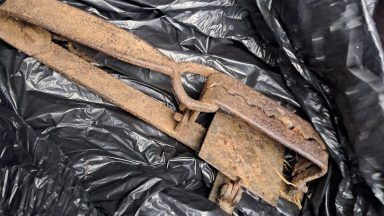Elderly patients say the NHS’s Hospital at Home programme has changed their lives by allowing them to receive safe medical care in the comfort of their own homes.
A new report from Healthcare Improvement Scotland has found that the expansion of its “virtual ward” service across Scotland has saved over £50m and kept around 15,500 people from staying in hospital for treatment over the past year.
The programme is designed to treat patients at home, often with remote monitoring using technology, without the need to be separated from family and friends.
It also helps to reduce the risks associated with hospital admissions, such as increased risk of catching infections and a decrease in mobility and independence.
Among those who have benefited is Norman Cumming, 77, from Chapelhall, who was born with brionchiectasis.
Over the years, he developed asthma and was diagnosed with Chronic Obstructive Pulmonary Disease (COPD) in 1990 – a progressive, incurable lung condition. Symptoms include shortness of breath, frequent chest infections, and fatigue.
 Supplied/NHS Scot
Supplied/NHS ScotThe pensioner takes daily medication and uses an inhaler, but occasionally needs to visit his GP clinic for nebuliser treatment, where medication is delivered as a fine mist to help ease his breathing.
His wife Tina, 64, told STV News: “This past year has been the worst it’s been. It takes a lot out of him – he gets tired easily, his breathing is affected easily. This last spell, with the hot weather, he has really struggled with that.
“He sometimes has to sleep all day to rebuild his energy.”
The couple were first told about Hospital at Home while visiting their GP clinic in December 2024.
“I thought it was a brilliant idea,” Norman said. “In hospital, you’ve got to wait for attention. At home, I know there’s someone there for me if I need help.
“It’s a safe environment, and I’m not worrying about picking up other infections.”
Tina added: “Norman was absolutely delighted – obviously any infection he gets causes more damage to his lungs.
“It eases the pressure on us by being at home – Norman gets really agitated in hospital and likes the comfort of his own bed. He also loves drawing and painting, which he can’t do in hospital.”
The couple have used the Hospital at Home Service four times since January. Each time, care was provided for between one and two weeks.
On the first visit they were provided with monitoring equipment, including a blood pressure cuff and thermometer, linked to a mobile phone that sent readings to the care team four times a day.
Norman was also able to receive nebuliser treatment and oxygen support without leaving the house.
The couple are encouraged to call for help whenever they need it, with a nurse sent to their home if required.
Tina said: “At first I was a bit wary because I’m not very techy, but it was so straightforward. They reassured us we could call any time, and they really meant it.
“For me, it’s just easier being here with him. When he’s in hospital I’d be up and down every day, juggling work and everything else. Now I can support him if needed.
“Without this service, he’d be in hospital longer, he’d be more anxious, and it would take him longer to recover.”
Norman said: “It has made a big difference to our life. The staff are so helpful and cheery – they always comes in with a smile on their face. They are fantastic.”
‘It’s a win-win for everyone involved’
Bill Denholm, 85, from Stenhousemuir was recently treated by NHS Forth Valley’s Hospital at Home team.
His wife Marion, 82, said: “There are no words to adequately describe the care and attention Bill received.
“We’ve had doctors, advanced nurse practitioners, physiotherapists, occupational therapists, a dietitian and a speech and language therapist all visit our home to provide the care and treatment he required so he didn’t have to go into hospital.
“This meant he was able to stay in familiar surroundings with his family and still receive the same type of care he would have in hospital. I also felt very supported as I could contact the Hospital at Home team direct if I had any worries or concerns.
“I can’t praise the Hospital at Home service enough. It makes so much more sense to treat people in their own homes if you can rather than occupy a bed in a busy hospital. It’s definitely a win-win for everyone involved.”
Hospital at Home saves £39m in costs
The report estimated £39m has also been saved due to reduced healthcare usage in the six months following hospital at home discharge.
More than 1,600 patients were treated on average each month, up from 1,400 on the previous year, with around 15,470 people prevented from spending time in hospital.
More than 650 extra hospital beds and almost 500 care home admissions would have been required over the year if hospital at home services did not exist.
Belinda Robertson, associate director of Improvement at Healthcare Improvement Scotland, said: “It seems that Hospital at Home is very much here to stay. We are finding that more NHS boards are not just increasing the numbers receiving acute hospital care at home, but that their services are maturing, becoming more efficient and being set up in such a way as to ensure they are sustainable.
“Making sure that Hospital at Home services are sustainable in terms of resources and capacity has been one of our main focuses over the past year, and we’re delighted to see Scotland’s NHS boards achieving this.
“For patients, the benefits of being able to be treated in the comfort and familiarity of their own homes is clear to see and this is set to continue.”
The Hospital at Home service mostly provides care for frail, older people in their own homes who may be suffering from acute illnesses and health conditions such as respiratory and cardiac issues, infections, or require treatment after a fall.
First Minister John Swinney recently announced funding of £85m which will allow 2,000 beds across Scotland to be made available through the Hospital at Home service.
Health secretary Neil Gray said: “This report shows we are delivering personal, efficient and reliable care to patients across the country. Our expansion of Hospital at Home means more people will benefit from first-class NHS care in the comfort and familiarity of their own homes.
“By increasing capacity to 2,000 beds by December 2026, we’re on track to create the largest ‘hospital’ in Scotland – bringing care closer to where people live and need it most.
“I am delighted to see the positive impact Hospital at Home is having across Scotland, particularly for elderly patients who can now receive high-quality care without the need to travel to hospital. I am grateful to all of the partners who are delivering this service and look forward to its further expansion in the months ahead.”
“First Minister John Swinney recently announced funding of £85m, which will allow 2,000 beds across Scotland to be made available through the Hospital at Home service.”
Follow STV News on WhatsApp
Scan the QR code on your mobile device for all the latest news from around the country




























